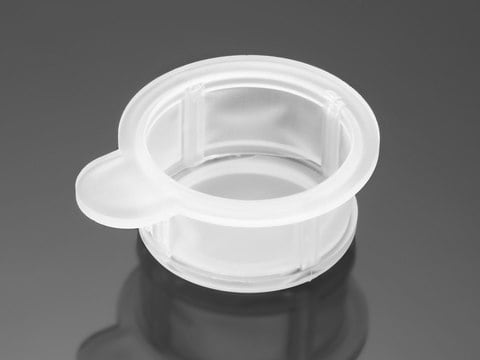D1947
Diffinity RapidTip®
for PCR Purification
Sinônimo(s):
PCR clean up tip, PCR purification tip, PCR reaction clean-up tip
Faça loginpara ver os preços organizacionais e de contrato
About This Item
Produtos recomendados
Nível de qualidade
forma
solid
fabricante/nome comercial
(Diffinity Genomics, Inc.)
capacidade
50(µL)
temperatura de armazenamento
room temp
Procurando produtos similares? Visita Guia de comparação de produtos
Descrição geral
Diffinity RapidTip effectively removes dNTPs, primers and primer dimers while providing greater than 90% recovery of pure DNA fragments from 100 bp to 10 kb. The functional pipette tip contains everything you need for PCR purification. The tip is filled with a proprietary adsorption technology that has a differential affinity for PCR components. The dispensed solution yields purified, high quality DNA ready for downstream applications such as DNA sequencing, SNP analysis and microarray printing.
Aplicação
Diffinity RapidTip® has been used in PCR product purification.
Características e benefícios
- Single step
- Recovers 90% of high quality dsDNA
- Optimized for 25 μL RXN
Informações legais
RapidTip is a registered trademark of Diffinity Genomics, Inc.
Certificados de análise (COA)
Busque Certificados de análise (COA) digitando o Número do Lote do produto. Os números de lote e remessa podem ser encontrados no rótulo de um produto após a palavra “Lot” ou “Batch”.
Já possui este produto?
Encontre a documentação dos produtos que você adquiriu recentemente na biblioteca de documentos.
H Kühlwein et al.
Journal of applied microbiology, 115(5), 1091-1106 (2013-07-31)
To assess the effects of dietary Saccharomyces cerevisiae β-(1,3)(1,6)-D-glucan supplementation (MacroGard(®)) on mirror carp (Cyprinus carpio L.) intestinal microbiota and ultrastructure of the enterocyte apical brush border. Carp were fed either a control diet or diets supplemented with 0.1, 1
Sarah L Dean et al.
Molecular ecology, 23(6), 1364-1378 (2013-10-12)
Nitrogen (N) deposition rates are increasing globally due to anthropogenic activities. Plant community responses to N are often attributed to altered competitive interactions between plants, but may also be a result of microbial responses to N, particularly root-associated fungi (RAF)
Teruaki Nakatsuji et al.
Nature communications, 4, 1431-1431 (2013-02-07)
Commensal microbes on the skin surface influence the behaviour of cells below the epidermis. We hypothesized that bacteria or their products exist below the surface epithelium and thus permit physical interaction between microbes and dermal cells. Here to test this
Michael J Goblirsch et al.
PloS one, 8(7), e69831-e69831 (2013-07-31)
A major hindrance to the study of honey bee pathogens or the effects of pesticides and nutritional deficiencies is the lack of controlled in vitro culture systems comprised of honey bee cells. Such systems are important to determine the impact
Lisa A Santry et al.
Virus research, 175(1), 30-44 (2013-04-16)
Maedi-visna virus (MVV) and caprine arthritis encephalitis virus (CAEV) are related members of a group of small ruminant lentiviruses (SRLVs) that infect sheep and goats. SRLVs are endemic in many countries, including Canada. However, very little is known about the
Nossa equipe de cientistas tem experiência em todas as áreas de pesquisa, incluindo Life Sciences, ciência de materiais, síntese química, cromatografia, química analítica e muitas outras.
Entre em contato com a assistência técnica









